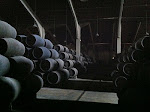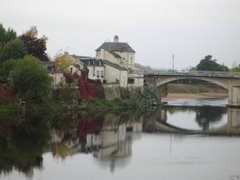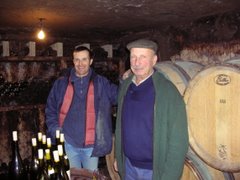Conversation with Becky Wasserman - Part 3
This wraps up my recreation of our conversation, and I hope it's been half as interesting and edifying to read as it was to actually sit and talk with Becky and Peter.
BG: What is the biggest change in Burgundy from 30 years ago until now?
BW: It's a generational change. The kids went to viticulture school and their equipment and wine making is super clean. Clean is an inexact word, because when you walk into the cellars they're still covered in the beautiful furry mold, but everything is clean. And they're interning with wineries all around the world. They taste at each others places now - Roumier, Grivot, and others, they go to each others' places for lunch and to taste. That wasn't common in the old days. Another issue is land pricing. Real estate price is now more important than the revenue you can earn from the wine on it. Land is so expensive in Burgundy now that its out of the hands of Burgundians, and that was never the case. You have to have financial backers if you're buying decent land in Burgundy.
PW: There has been change in the wine making too. There were pioneers - Lafon, Roumier, Arlot, Dujac - their first focus was on achieving a base level of cleanliness (Becky again doesn't exactly agree with the word 'clean'), but then they realized that you don't make a wine in the winery, you make better wine with a better vineyard and a better plant.
BG: Where do you stand on organics and biodynamics?
BW: We check the biodynamic calendar before opening a fine wine.
PW: (Chuckles) Yeah, but we have no dogma on this. You don't have to be biodynamic for us to work with you or to make great wine, there are no technical requirements. We never say to wine makers that they should do this or do that with their wines. The biggest intervention we ever have is to introduce a young wine maker to another wine maker whose wines we like, and hope that they hit it off.
BG: What in your view is the biggest threat to Burgundy as we know it?
BW: My 4:00 AM fear is that genetically modified yeasts will take over.
BG: You mean the yeasts that you can buy in bags at wine making stores?
BW: No, not just the industrial ones, genetically modified yeasts. Yeasts are invasive and they have a lot to do with the taste of wine. Each vineyard can have its own yeasts, and that's a lot of the taste of the wine from that place. I'm afraid of the market pressures that result when people say 'We don't want to wait 10 years to drink this wine, we want to drink it quickly,' for example. Yeasts used for things like this can take over the taste of wine.
BG: You've done 30 years in this business. What are your goals for the future?
BW: (Without hesitation) To spend more time in the vineyards. To stand there, to absorb, to look around, to touch, to feel.
BG: You want to work the vineyards? What would you do there?
BW: (Looks at Peter and speaking French, asks him how to say a word that sounds like 'Resourcée')
PW: You want to be a resource for them.
BW: Yes. I want to be in the vineyards more.
PW: I want to find a way to communicate more effectively, to create educational opportunities. I've been working with people on a project in New Orleans, the Independent Champagne & Sparkling Wine Invitational, and I'm really excited about it. I want to create more opportunities like this to showcase the kind of wines we believe in and to help educate people.
BG: How do you feel about blogs and other new media in the realm of wine writing?
PW: Blogs need to be more accountable. The blogosphere is helping to perpetuate the fallacy that flaws can be terroir. I've had wines that are flawed - plain and simple, but I'm seeing a small niche in the blogosphere that is confusing these flaws with terroir. Many bloggers just don't have enough classic tasting knowledge to be able to understand the difference between funky wines that show terroir and flawed wine. On the other hand, it's much harder to get things into Wine Spectator than it is to get things into blogs.
BW: I like the blogs. There are some you want to read because their voice appeals to you, others don't. I'm glad that there's a lot of wine talk out there.
BG: What do you find yourselves drinking these days when you're drinking wine?
PW: We get equally excited drinking Passetoutgrains as we do drinking Clos de Chênes. It depends on the food we're eating. If we're having a simple Sunday roast chicken lunch, we drink Passetoutgrains or Bourgogne and we love it - those are great wines. For me it's about context and about the wine being ready to drink.
BW: Yes, that's very important. Drinking Grand Cru or 1er Cru wines when they're young is a shame. Young wines are like young people - they haven't found their personalities yet.
BW and PW: (Plaintively) Can we go now?
BG: Yes, and thank you for talking with me







1 comment:
Brooklyn Guy,
Great!! A nice interview- I really love that you sat down with these great importers. I would have loved to hear more about what peter thought were flaws vs. terroir, and what blogs was thinking about.
Thanks,
Ben
Post a Comment